“Shōgun” stars Anna Sawai and Hiroyuki Sanada, Emmy nomination predictions, and more in EW's “The Awardist”
The stars of the epic FX limited series reflect on their characters' profound journeys and the joy of getting to make the series. Plus, nomination predictions in the lead acting categories, in EW's "The Awardist" digital magazine.

Illustration by Kagan McLeod
Why Shōgun is so meaningful and important to stars Anna Sawai and Hiroyuki Sanada
Interview by Gerrad Hall
Illustration by Kagan McLeod
Fox announced in 2013 that it was developing a new limited series based on James Clavell's 1975 novel Shōgun. Eleven years ago, the series finally debuted in February 2024 — but on FX, which ordered the series in 2018. Earning rave reviews for its cinematic scope and scale, EW critic Kristen Baldwin said of the series in her A- review, "Gorgeous and immersive from the very first frame, the new Shōgun is a stunning epic that never lets big-budget set pieces overshadow the human drama at its core."
The layered historical drama — set in 1600s Japan — is rich in material, and was previously adapted for the small screen for a 1980 NBC miniseries starring Richard Chamberlain, Yoko Shimada, and Toshiro Mifune. That one scored fourteen Emmy nominations, going home with three (Outstanding Limited Series, costumes, and graphic design and title sequences) — and this new version, from creator Justin Marks, could rack up as many at the 2024 Emmys, where it is considered a frontrunner (facing some stiff competition!) in the Limited or Anthology Series category at the 2024 Emmys.
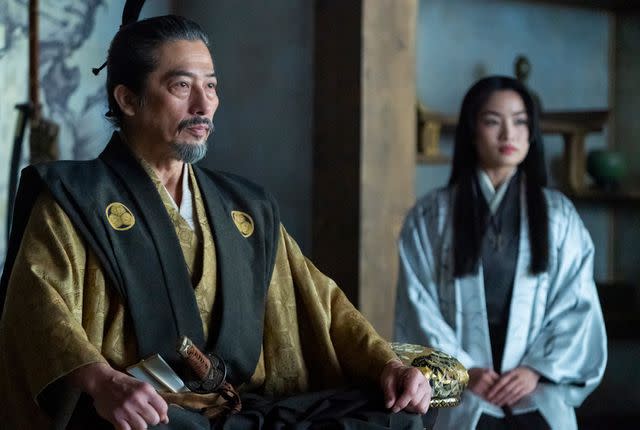
Katie Yu/FX
Hiroyuki Sanada and Anna Sawai in 'Shōgun'Leading the way are Japanese acting legend Hiroyuki Sanada and rising star Anna Sawai, who play Lord Toranaga and his translator, Lady Mariko. Caught up in a power struggle between feudal clans, things are made complicated for Toranaga when a strange ship piloted by Englishman John Blackthorne (Cosmo Jarvis) suddenly appears in their harbor. Mariko communicates between her Lord and the stranger believed to be a pirate, slowly growing close to him as she learns more about his world and travels.
Sanada and Sawai spoke with EW's The Awardist about reaction to the series, earning his first producing credit, some of their emotionally anguishing scenes, and this story of loyalty, duty, integrity, deceit, and death.

Illustration by Kagan McLeod
THE AWARDIST: Reviews for this have been so wonderfully positive. It is a project that I know took a lot of time to film and with great care. Have you read the reviews? Have you been paying attention to viewer reaction?
HIROYUKI SANADA: I just saw some reviews and they were so excited. Especially for Mariko's story, episode 9, and everybody's saying she's done a great job. And I totally agree. Only Anna could make it. This role is so complicated, hard, not only language-acting, but also fighting, emotion, everything. Oh my goodness. Congratulations, Anna.
ANNA SAWAI: Aw, thank you. Hiro. Honestly, I would not have been able to play a character like Mariko without the help of Hiro. So truly, I owe it to everyone who was part of the production. But the reactions have been amazing, honestly. It's so fun watching with the audience because you get fresh takes on everything. They'll choose specific lines and they'll make memes out of it. And it's actually quite funny the way they react to it. I've also received a ton of messages after episode 9 being like, "No, how dare you." I wish I could just respond to everyone, but it's just been so lovely.
It is a big, sweeping, epic series. I'm curious if both of you could feel that scope and scale while you were filming?
SAWAI: Reading the script really made me feel like, okay, this is going to be huge. It's going to take a village to really make this come to life. But I don't know if I understood how amazing and how detailed everything was going to be portrayed until I saw the final edit. But walking onto the set and just seeing the castles done and the hundreds of extras, the background people with hair and makeup, it really was. And it felt like something that hadn't been seen. And also I'd never experienced anything like it.
SANADA: Yeah, me too. It was a crazy, huge set they created. The whole village, whole harbor with the buildings and castle and then real-sized ship — two ships.
It's impressive, great for all of you to have that kind of physical stuff and not just be all green screen, which is often the case now.
SAWAI: Also, I feel like usually when you're on a show they'll be like, oh, we are running out of budget. We can't do this and that. But with our show, from what I heard, they were giving us a little bit more budget. So to me, it was like, okay, the studio's watching this and they think that this could be amazing. So we were given more and that to me was already telling.
I'm so curious about your take on this version of Mariko as opposed to the 1980 mini-series, because she gets to fight, she certainly on the exterior is a bit tougher than the previous version. So I'm curious your take on the updates that were made to the character and really what you were particularly excited to get to explore with her.
SAWAI: I haven't watched the '80s series because I was instructed not to, so I can't really make a comparison there. But I obviously read the novel and we wanted to take the beautifully crafted Mariko and then bring her to life, but also add certain perspectives of a Japanese woman because it felt like I could add a little bit more suffering. I could add a little bit more small elements. And the thing is, in the book, Mariko does fight, and that's also based on our history — women of the samurai class got training so that they could protect themselves when needed. And so I wanted to bring the inner strength, which I felt like we hadn't seen too much in Western media. Lots of conversations with [writers] Rachel Kondo and Caillin Puente, especially for episode 9. They wrote a beautiful story that I feel could have only been written by a woman.
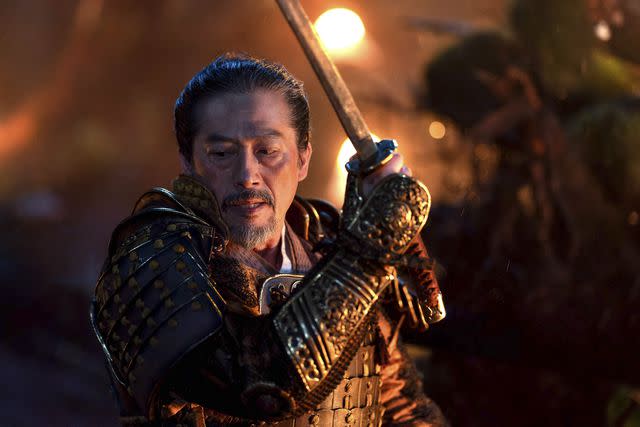
Katie Yu/FX
Hiroyuki Sanada in 'Shōgun'We're going to come back to that episode in just a minute. Hiro, I got to ask you here, this series is, it is a first for you in that it is your first producer credit. So first of all, congratulations on that, but secondly, I'm wondering how you got to fully take advantage of that credit and enact those duties of what a producer does?
SANADA: First of all, I got an offer just as an actor, and then after Rachel and Justin came to the project, then they asked me to [produce]. I was happy to introduce our culture to the world correctly, and we could hire the Japanese samurai movie specialist for wigs, costumes, gestures, everything. So I had a team — so much easier than usual — and just really enjoyed the collaboration with the Western crew and the Japanese crew. So much fun. Every day I was on set, even if I had no shooting as an actor. So much fun! Of course, I had a responsibility and pressure, but more than that, so much fun. I really enjoyed it. So when I was standing in front of this camera, it was like a freedom or reward. Just be there as a character — just react to others.
You started acting when you were 5 years old, and you've started in some very big Hollywood titles, especially in recent years with Avengers: Endgame and John Wick Chapter 4, Bullet Train, and The Wolverine. As you think about and look at your résumé and list of credits, what does this particular project mean to you?
SANADA: It's huge. I grew up as a child actor and then I watched a lot of Hollywood movies, European movies, and then I wanted to work with those great filmmakers and actors in the future. That was my childhood. And then, I started learning a lot of things as an actor. And finally, almost after 40, my first Hollywood film comes — it was The Last Samurai. After that, I tried to choose international projects and then move to the U.S. [For] almost 20 years, I tried to learn and try to make Japanese culture look better or correctly — and then finally, after 20 years, I got a title of producer. It's huge. So I put all my experience in my life into Shōgun. I was so lucky and happy, and it's going to be a big step for the future for me, or for the industry [with] Japanese actors I believe. So that's meaningful for me.
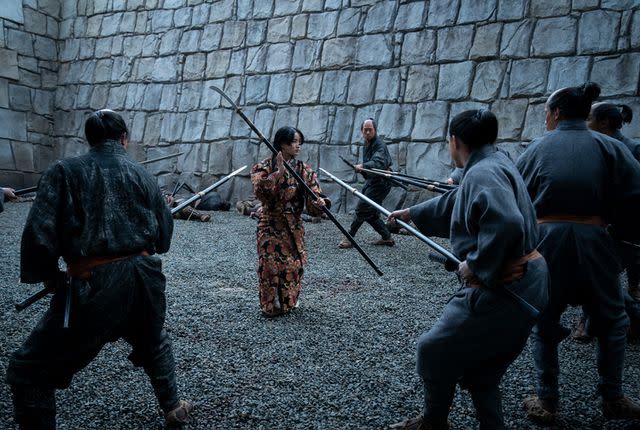
Katie Yu/FX
Anna Sawai in 'Shōgun'Anna, mentioned earlier episode 9 and how important that was. In particular, when Mariko tries to leave Osaka and gets into the spear fight, it really feels like the beginning of her breaking point. Can you take me a little bit into that? I feel like there was a shift in mindset with that episode.
SAWAI: Oh yeah, for sure. I think that we see two shifts. One is in episode 4 where she thinks that her husband is now dead, so we kind of see her open up a little bit as a human being, we see her kind of have a light smile on her face. And then once her husband comes back, everything is shut down again. She's also kind of lost in life. She doesn't really know if she is any good for the Lord. She's not serving him properly, and so she asks for permission to take her own life. And then at the end of episode 8, we see that she finds resolution, she understands that it was all part of Toranaga-sama's plan, and she finds clarity. That's what she's walking with when we enter episode 9, and that scene where she attempts to walk out of the castle, a lot was going on mentally because while she does have the conviction, she's also seeing all these men sacrifice their lives to make this happen. And even though it's ultimately for the Lord, they're trying to protect Mariko-sama. I called her Mariko-sama. [Laughs] That's the first time I've called her Mariko-sama. [Laughs] Sorry, I have to pause...
SANADA: [Laughs] You are already apart from Mariko-sama. Now you are Anna.
SAWAI: Yeah, that's so interesting! I always call her Mariko because she's a part of me. I don't want to pay respect to the character, but yeah, okay, wow. But yes, so she's seeing all these people sacrifice their lives, but then at the same time, I don't believe that she thinks that she's going to die. She knows that they aren't going to kill her; this is just a way to send the message. But when she's fighting and she's down on the ground, it is a shameful thing. The way they're treating her, and the way that they're not allowing her to fulfill her purpose to the Lord, that's shameful. But then when she does walk away, we kind of see her tears go back, and she is moving forward with, again, clarity. And so I think that's many, many conflicting emotions, very mixed up and interesting,
Backing up to episode 8, when Hiromatsu commits seppuku, Lord Toranaga goes through so many emotions there. Am I perhaps right in thinking that that may have been one of the more difficult scenes to get right in terms of what you needed to convey?
SANADA: From the beginning when we did casting, I said, only Tokuma Nishioka can do this role because we have a long history together, over 40 years. Sometimes he played my dad or opponent samurai or doctor and patient, so Hiromatsu and Toranaga have to show to the audience a long history, background of them, without a word, just looking at each other. We can read the subtitle. That was important. So yeah, the casting was right and then everybody was happy. And then also, that scene was a little different from the original idea and more focused on Hiromatsu and then more [drama was] created. So yeah, it was a hard day to shoot, but always high tension. And then, my work is: Don't cry. [Laughs] Have to pretend in front of the spies or even my guys, I have to disguise. So that was my mission. It was so hard. [Laughs]
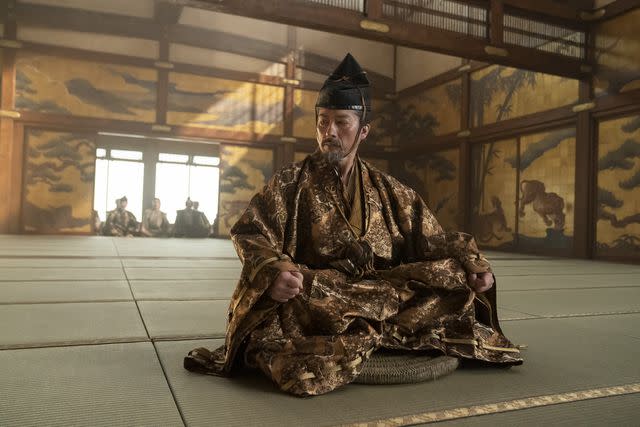
Katie Yu/FX
Hiroyuki Sanada in 'Shōgun'Well, it's a wonderful scene. Which brings me to an interesting quote. Mariko says this a couple times: "We live and we die. We control nothing beyond that." It's such an important line in this series because death is so prevalent. You also don't want the entire story to feel so weighted down that it feels difficult to watch, so I'm curious about finding a balance of that within the story, how all of you approached that.
SAWAI: Well, I was playing it all dramatically. [Laughs] What's so funny is that I'm watching these scenes and I was only approaching it from Mariko's point of view. So I'm sitting in the dinner scene and Buntaro and Blackthorne are having this drinking game, and she knows that it's all about to go down, so it's something that she dreads. But then the way that they're all playing it, it's actually funny, and I'm only realizing it now because I'm kind of viewing it from a different point of view. But I don't know if I was able to balance out the heaviness, to be honest. Maybe it's like the character of Blackthorne is so opposite of her, where he's trying to control everything, and so with that, it's a juxtaposition of Mariko who says, you can't control anything, you kind of have to just let it be. So maybe that's how it worked. I don't know. I was pretty heavy into everything.
Serious stuff aside, among both of your many talents is that you both sing, you were both singers, you have recorded albums. Did the two of you ever break out into song together on set?
SAWAI: Every single day.
SANADA: [Laughs]
SAWAI: I'm just kidding. No.
SANADA: Yeah, and unfortunately we [were filming during the coronavirus], so we couldn't go to karaoke on the weekend. Even cannot go out for dinner. So we had no chance to sing together.
SAWAI: Maybe in a future season, we'll do Shōgun: The Musical.
We just need to get the two of you together for a collaboration.
SANADA: [Sings "Mariko," in the fashion of West Side Story's "Maria"]
Anna, you were also in a girl group, Faky. In what ways did the discipline required for that prepare you for acting in something as challenging as this?
SAWAI: I really did enjoy being with the girls and being a J-pop singer for a while. But prior to even joining the group, my team knew that I wanted to act. And when I did join, I found out that it wasn't really going to be possible, and I felt like I wasn't in control of my own career and knew that I had to make the choice to leave if I wanted to pursue acting. It was also a tough time, but because I couldn't freely audition for things, now when things are hard, I'm able to really put in the work. And without really good work ethic, I think a project like Shōgun, a role like Mariko would not have been possible for me to play. So I'm grateful for the experience.
This interview has been edited for clarity and length.
Listen to more of our in-depth interview with Anna Sawai and Hiroyuki Sanada, including Sawai on the relationship between Mariko and Cosmo Jarvis' Blackthorne, their hopes for how the series will change perceptions of Eastern culture, and more, in the podcast below.
Get the latest awards season analysis and hear from the actors, creators, and more who are contenders this season on EW's The Awardist podcast, hosted by Gerrad Hall. Be sure to listen/subscribe on Apple Podcasts, Spotify, or wherever you listen to your favorite podcasts, or via your own voice-controlled smart speaker (Alexa, Google Home).
Important Emmys season dates
May 9 — Entry deadline for Primetime programming that was originally released June 1, 2023-May 31, 2024
June 13 — Nominations voting begins
June 24, 10 p.m. — Nominations voting ends
July 17 — Nominations announced
Aug. 15 — Final voting begins
Aug. 26, 10 p.m. — Final voting ends
Sept. 7 and 8 — Creative Arts Emmy Awards and Governors Gala
Sept. 15 — 76th Emmy Awards and Governors Gala
2024 Emmy nomination predictions: Lead Actor and Actress in a Drama and Comedy Series
With Succession, Better Call Saul, Ted Lasso, Barry, The Marvelous Mrs. Maisel, and others out of the game, lots of slots are up for grabs in the acting categories. Here's who we think, right now, will land nominations. By Kristen Baldwin
Lead Actress in a Drama
Imelda Staunton, The Crown (Netflix)
Carrie Coon, The Gilded Age (HBO)
Emma Stone, The Curse (Showtime)
Maya Erskine, Mr. & Mrs. Smith (Prime Video)
Jennifer Aniston, The Morning Show (Apple TV+)
Juliette Binoche, The New Look (Apple TV+)
With The Crown and The Morning Show as the only repeat contenders, the acting race here and in all other drama categories will be refreshingly unpredictable. Oh, and let’s hope Emma Stone took a nice long nap after Oscar season because she’s about to hit the circuit again as a frontrunner for Showtime’s inexplicable (and unforgettable) The Curse.
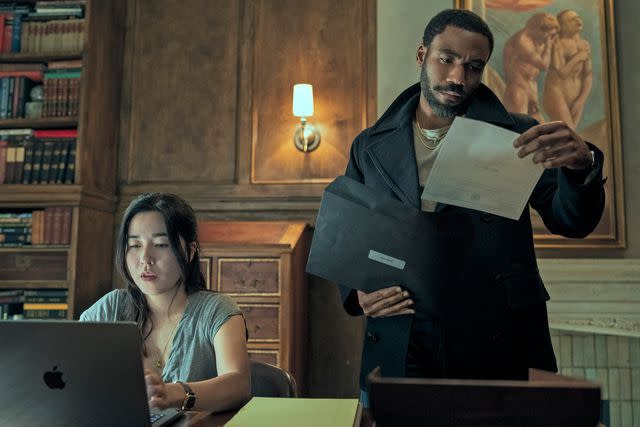
David Lee/Prime Video
Maya Erskine and Donald Glover in 'Mr. & Mrs. Smith'Lead Actor in a Drama
Gary Oldman, Slow Horses (Apple TV+)
Dominic West, The Crown
Donald Glover, Mr. & Mrs. Smith
Tom Hiddleston, Loki (Disney+)
Idris Elba, Hijack (Apple TV+)
Walton Goggins, Fallout
It may have taken three seasons, but word-of-mouth on Slow Horses finally reached U.S. awards voters this year. You can expect Gary Oldman to follow his Golden Globe nomination with a nod in this category. Even more exciting: This could (will!) be the year Walton Goggins gets his long overdue second Emmy nomination — and maybe even a third.
Lead Actress in a Comedy
Ayo Edebiri, The Bear (FX on Hulu)
Jean Smart, Hacks (Max)
Devery Jacobs, Reservation Dogs (FX on Hulu)
Selena Gomez, Only Murders in the Building (Hulu)
Quinta Brunson, Abbott Elementary (ABC)
The Bear’s Edebiri just won a few months ago in the Supporting Actress category, but for season 2, she’s graduating to Lead Actress — where she’ll likely join the Perennial Nominees Club with Brunson and Smart.
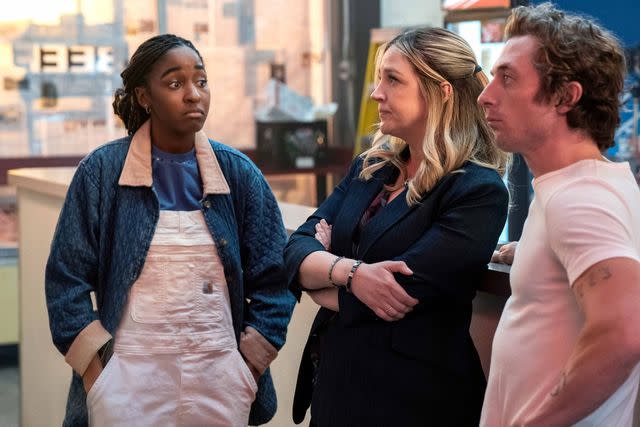
Lead Actor in a Comedy
Jeremy Allen White, The Bear
Martin Short, Only Murders in the Building
Steve Martin, Only Murders in the Building
Jharrel Jerome, I’m a Virgo (Prime Video)
Larry David, Curb Your Enthusiasm (HBO)
Compared to other races this Emmy season, the comedy actor category almost feels stagnant. But Jharrel Jerome, adorably naive and dorky as I’m a Virgo’s 13-foot-tall teenager, will be a welcome infusion of fresh blood.
See who else Kristen thinks is in the mix, and who she'd love to see get nominated, plus her picks for Supporting Actor and Actress in a drama and comedy, as well as the limited/anthology acting categories.
Emmys Flashback
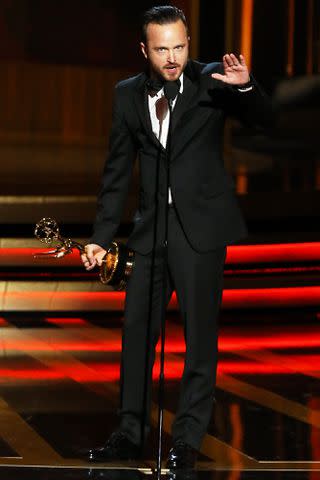
Michael Tran/FilmMagic
Aaron Paul at the 2014 Emmys"Vince Gillian, thank you so much — and the rest of the writers — thank you so much for not killing me off; that was the plan! My parents: Thank you so much for kicking me out of the house and telling me to chase this dream."
—AARON PAUL | SUPPORTING ACTOR IN A DRAMA SERIES, 2014 | BREAKING BAD
"
Check out more from EW's The Awardist, featuring exclusive interviews, analysis, and our podcast diving into all the highlights from the year's best in TV.
Related content:
Shōgun actress on shocking, explosive death: ‘She was going to go full-out’
Something truly bonkers just happened in Colin Farrell’s new show Sugar
Read the original article on Entertainment Weekly.


